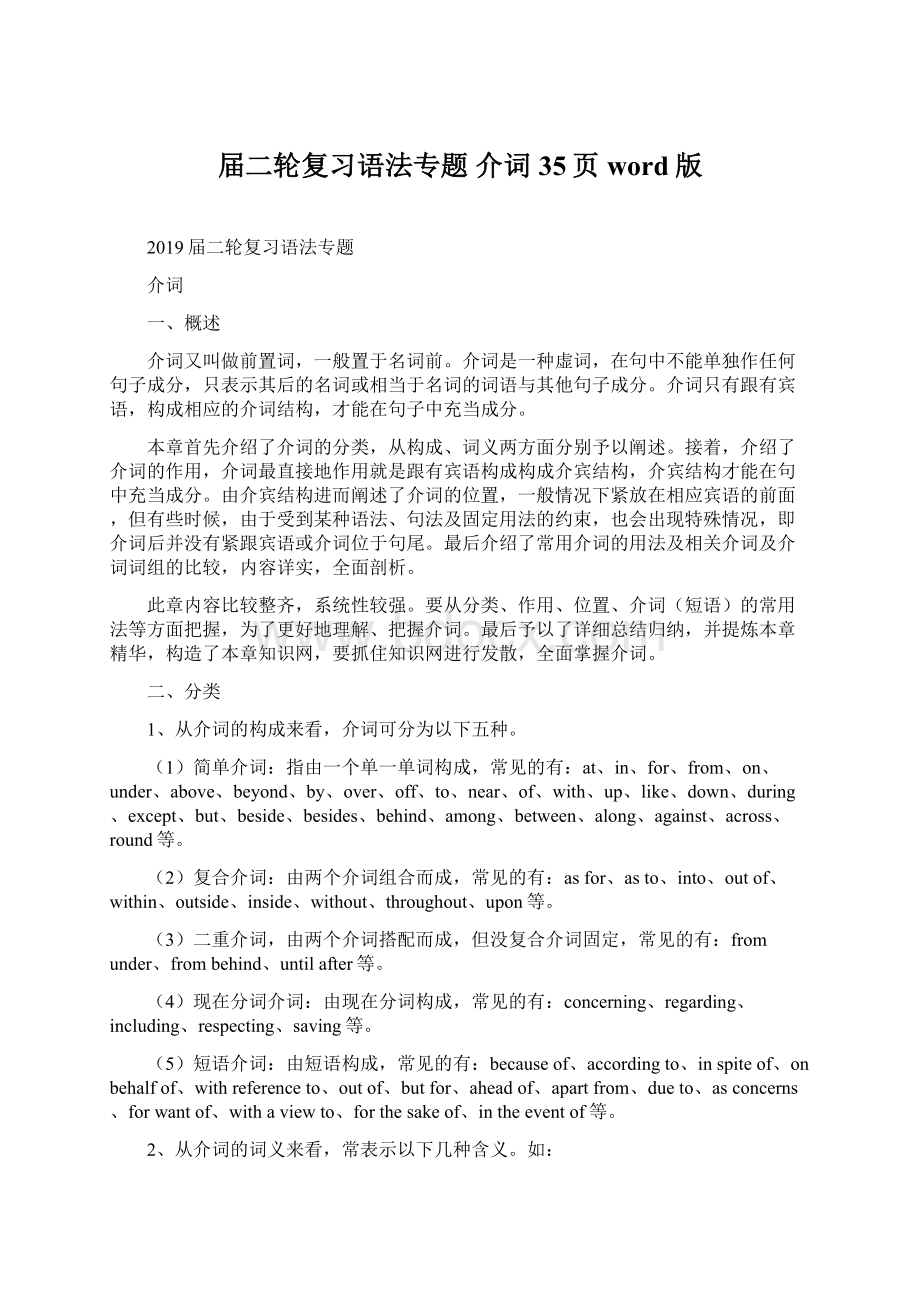届二轮复习语法专题 介词35页word版Word格式文档下载.docx
《届二轮复习语法专题 介词35页word版Word格式文档下载.docx》由会员分享,可在线阅读,更多相关《届二轮复习语法专题 介词35页word版Word格式文档下载.docx(36页珍藏版)》请在冰豆网上搜索。

becauseof、accordingto、inspiteof、onbehalfof、withreferenceto、outof、butfor、aheadof、apartfrom、dueto、asconcerns、forwantof、withaviewto、forthesakeof、intheeventof等。
2、从介词的词义来看,常表示以下几种含义。
如:
(1)表时间,如:
at、about、before、after、for、since、until、during、over、on、till、to、within、as、around、by等。
(2)表地点,如:
at、in、on、under、above、over、behind、off、near、around、below、beneath、beyond、across、along、among、into、towards、throughout等。
(3)表示除了,如:
except、exceptfor、besides、beyond、but、apartfrom等。
(4)表示所属关系,如:
of、with等。
(5)表示手段、方式,如:
by、with、in等。
(6)表示条件,如:
on、without、considering等。
(7)表示原因,如:
for、at、with、about、becauseof、dueto等。
(8)表示比较,如:
as、like等。
(9)表示关于,如:
asto、asfor、concerning、inrespectof、about、on、regarding、withregardto等。
(10)表示反对或赞成,如:
for、against等。
(11)表示让步,如:
inspiteof、despite、notwithstanding等。
三、作用
介词必须同其他词类或成分连用才能在句中充当语法成分。
介词和介词宾语一起构成介词短语,介词短语在句中可充当下列以下成分。
1、主语
Fromourdormitorytotheteachingbuildingisfive-minuteriding.
Betweentwoandthreepeoplewilldothejob.
2、表语
Somepeopleareagainstthedecision.
Thebookisonthedesk.
3、宾语
Thecriminalwillserveasentenceofbetween2and7years.
Theboyshowsupfrombehindthedoor.
4、定语
Thegirlwithalonghairissobeautiful.
Afriendinneedisafriendindeed.
5、状语
Hearrivedhomeataboutteno’clockatnight.
Consideringthetimeofthemeeting,weshouldgetupearly.
6、补语
Ifoundtheoldmaninbadconditionofhealth.
Hewaselectedaspresidentofthecountry.
上面我们提到,介词后必须跟有宾语才能构成介词短语,在句中充当一定的成分,下面讲述关于介词的宾语问题。
介词的宾语不仅限于名词和代词,还可以是其他词类或句子等。
(1)名词
Hecameintotheroomandsatonthechair.
Theprofessorwillmakealectureabouteducation.
(2)代词
Withthat,heleftoff.
Healwayscarriesthecellphonewithhim.
(3)形容词
Incommonwithothers,healsolikesChairmanMao.
Atmost,therearefourpeopleintheroom.
(4)副词
Hecouldseethemountainclearlyfromhere.
Hehadtoldmethisuntilrecently.
(5)动名词
Themanhadsomedifficultyindoingthejob.
Becauseofbeinglateforschool,theboywascriticizedbyhisteacher.
(6)不定式
Hecouldn’tdoanythingbutwait.
Thegirlknewbettertolovetheman.
(7)介词短语
Heworkeduntilintothenight.
Hecamefromoppositetheshop.
(8)数词
Oneintenstudentshasthechancetotakepartintheexam.
Afterschool,thestudentsleaveintwosandthrees.
(9)疑问词+不定式
Hegavemesomeadviceonhowtodothejob.
Hecalledtoremindmeofwheretomeet.
(10)疑问词引导的从句
Icareaboutwhowillwinthegame.
Ihadnoideaastowhetherhewillfollowme.
(11)that引导从句
HelikedEnglishinthathehadgreatinterestinit.
IwouldattendthemeetingbutthatIamseriouslyill.
对上述内容予以补充说明以下几点:
1、介词后一般用动名词做宾语,用不定式作宾语只局限在一些固定句型中,如:
can’tchoosebutdosth、can’thelpbutdosth、haveno(other)choicebuttodosth、donothingbutdosth、wouldrather(sooner)…thandosth、coulddonootherwisethan(to)dosth、knowbetterthantodo等结构中。
应注意,当介词后的不定式用以解释句中实义动词do时,不定式符号to可省略,即用动词原形作介词宾语,如上述结构中的donothingbutdo、can’tdoanythingexceptdo等。
2、应注意的是除了inthat、exceptthat、savethat、butthat、notwithstandingthat外,that引导的从句不可直接作介词的宾语,必须借用形式宾语it,然后再加相应that从句。
Youcan’tdependonitthathegivesyouanyhelp.
3、形容词作介词宾语情况是不多的,常用于固定词组中。
incommon、inshort、atmost、atleast、forthebetter、infull、inearnest、forsure、frombadtoworse、atlarge、ofold、inthewrong、oflate、tothefull、onthewhole等。
四、位置
1、介词通常位于名词或代词前。
Therearemanybirdsinthetree.
Didyoubelieveinhim?
2、在某些特殊句法结构中,介词也可放在句尾。
(1)以which、what、whose、who引导的疑问句,介词常放在句尾。
Whichareyoupointingat?
Whatroomdoyoulivein?
Whoareyoutalkingto?
(2)定语从句中位于which、whom之前的介词可以放在句尾。
Heisthemanthat/whoheturnstoforhelp.
Themanishisteammatethat/whoheoftenwalkswith.
(3)某些以-wh词引导的名词性从句中,关系代词位于从句句首时,介词应后置。
Idon’tknowwhattheboylookslike.
Courageiswhatheisinneedofwhenhefails.
(4)动词不定式作状语,需要介词同句中主语构成介宾关系时,介词后置。
Theroomiscomfortabletolivein.
Thewaterishottobathein.
(5)动词不定式作后置定语,不及物动词后的介词同所修饰的名词构成介宾关系,介词后置。
Thatisagoodplacetogoto.
Thisisthepentowritethenovelwith.
3、在不及物动词+介词结构中,介词紧放名词前,构成介宾结构。
Hearrivesatschoolearly.
Heliesonthegrass,lookingatthebluesky.
五、常见介词用法
1、about
(1)表示“大约”。
Theoldmanisabouteightyyearsold.
Hearrivedatabout8o’clock.
(2)表示“在…周围,在…附近”。
Allthestudentsstandabouttheirteacher.
Theysitaboutthetabletocelebratethanksgivingday.
(3)表示“关于”。
Hegavemesomesuggestionsaboutwhattodowiththeproblem.
Thestoryisaboutapoorgirl.
(4)表示“对…采取措施”。
Wemustdosomethingabouttheairpollution.
Somethingshouldbedoneaboutthehighrateofthecrime.
(5)表示“从事”。
Whatareyouabout?
(6)表示“在身体的某个部位”。
Ifeltpainfulaboutmyleftleg.
(7)表示“在身边”。
Isthereanymoneyaboutyou?
2、above
(1)表示“在…上”。
Thereisalightabovethedesk.
Thesunrisesabovethesealevel.
(2)表示“越出…(能力、范围等)”。
Thequestionissodifficultthatitisabovemyability.
Thetheoryisabovemyhead.
(3)表示“(数量、时间上)多于、超过”。
Ithasbeenabovenineo’clock.
Thecarcoststhemanabovetwomillion.
(4)表示“(在地位、级别上)高于、优于”。
Thedeanofacollegeisabovethevicedeaninrank.
Hegotapositionabovetheminister.
(5)表示“不屑于”,常用beabovedoingsth结构。
Ithinkthegentlemanisabovedoingsuchabadthing.
Thehonestboyisabovetellingalie.
(6)表示“在…北方”。
There’sasmallvillageabovethehill.
3、after
(1)表示“(时间)在…以后”。
Aftertenyearsoutside,hecamebacktohishometown.
Hecametotheclassafterfouro’clock.
(2)表示“(位置)在…后面”。
Thiswayplease,afteryou.
(3)表示“(地位、重要性等)低于、次于、不如”。
Afterlife,timeisimportant.
(4)表示“紧接着”。
Dayafterday,hemakesgreatprogress.
(5)表示“(让步)尽管”。
Aftergreateffortsinthesubject,hedidn’tpasstheexamfinally.
(6)表示“因为、由于”。
Afterhispastexperienceofcommittingcrimes,thepolicepayspecialattentiontohim.
(7)表示“追求、追赶、寻找、询问”。
Idon’tknowwhatheisafter.
Youshouldinquireafterthebusstationforsomefurtherinformation.
(8)表示“按照、遵循”。
Hewasnamedafterhisfather.
(9)表示“符合、与…一致”。
Hisperformanceinschoolisn’tafterhisparents’expectations.
4、against
(1)表示“反对”。
Hissongoesagainstgoinghiking.
(2)表示“依靠”。
Don’tstandagainstthedoor.Thedoorhasbeenbroken.
(3)表示“向着、正对着”。
Theshopliesagainstthepostoffice.
(4)表示“对…不利”。
Suchbadweatherisagainstthesportsmeet.
(5)表示“同…竞争”。
Hestudiedveryhardagainstthetime1o’clock.
(6)表示“抵抗、抵挡”。
Weshouldbuildahighbankagainsttheflood.
(7)表示“以…为背景”。
ThefilmisfullofbloodanddeathagainsttheWorldWarⅡ.
(8)表示“和…相比”。
Thetimeofthemeetingisthreehoursthistimeasagainsttwohourslasttime.
(9)表示“以…为标准”。
Peopleshouldbalancewhattheyspendagainstwhattheyearn.
5、at
(1)表示“(地点)在…里,在…上”。
Therearetwoshopsattheschool.
(2)表示“(时间)在…时刻、在…岁数”。
Hewenttocollegeat18.
(3)表示“向着、朝着”。
Themanpointedattheboyangrily.
(4)表示“以…价格”。
Theappleswillbesoldattherateof10dollarsapound.
(5)表示“以…速度”。
Thecarrunsataspeedof300kilometersperhour.
(6)表示“处于…状态”。
Theprogramisatitsbest.
(7)表示“因为、由于”。
Atthegoodnews,theboyjumpedveryhigh.
(8)表示“按照”。
Heattendedthepartyatherrequest.
(9)表示“在…方面”。
Heisgoodatmath.
(10)表示“隔着一段距离”。
Thereisatreeatashortdistance.
6、before
(1)表示“(时间)在…之前”。
Wemustfinishthetaskbefore8o’clock.
(2)表示“(地点、位置)在…前面”。
Thereisasmallriverbeforemyhome.
(3)表示“(表示重要性、顺序等)先于”。
Allthefactoriesputqualitybeforequantity.
(4)表示“宁愿…而不…”。
Iwillchoosedeathbeforeshame.
7、beyond
(1)表示“超出,非…所能及”。
Thelittlecouldn’treachthebasket,it’sbeyondhisreach.
(2)表示“在…的那边”。
Therearemanyhousesbeyondtheriver.
(3)表示“在…以外”。
Thecompanyplantobringinsomenewtechnologybeyondseas.
(4)表示“除了…以外”。
Idon’tknowanythingelseabouttheaccidentbeyondwhatyou’vetoldme.
(5)表示“迟于、晚于”。
Youshouldn’tstayupbeyondteno’clock.
8、by
(1)表示“(方式)凭、靠”。
Hecametoschoolbycar.
(2)表示“在…旁边”。
Theboyreadsthenewspaperbythewindow.
(3)表示“(方位)偏于”。
Theshipsailedinthedirectionofeastbynorth.
(4)表示“(时间)到…之时”。
Bynow,hehasalreadylearned5,000words.
(5)表示“在…时候”。
Heearnsmoneybydayandsleepsbynight.
(6)表示“握、抓”。
Thepolicemancaughtthethiefbythearm.
Heseizedthechancebychance.
(8)表示“根据、按照”。
Mostimportantly,weshouldjudgeapersonbyhismorality.
(9)表示“按…计算”。
Theworkersarepaidbythemonth.
(10)表示“差…(常用在比较级结构中)”。
Myfatheristallerthanmebyahead.
(11)表示“对待”。
Theboywasbadlydonebyinthefactory.
9、for
(1)表示“对…而言”。
Theproblemisdifficultforme.
(2)表示“(目的)要求、为了”。
Hecametothebusstationforaticket.
(3)表示“为得到、为成为”。
Theteachertrainedthestudentsforgoodbasketballplayers.
(4)表示“适合”。
Heisthesuitablemanforthejob.
(5)表示“(时间、数量、距离)达、历程等”。
Theywalkedforabout500metersaday.
(6)表示“(方向)去、往”。
Heleave